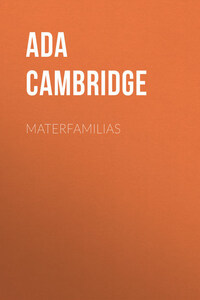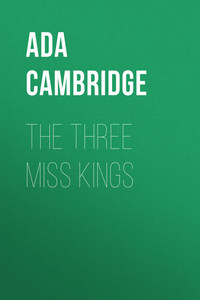IT was about a month after the foregoing conversation took place, that Melbourne society was fluttered by a rumour that the engagement between Mr. Kingston and Miss Fetherstonhaugh, which had been unaccountably broken off, was "on" again, and that the long-delayed wedding was to take place immediately. Rumour for once in the way, was perfectly correct.
People went to call at Toorak, and found the aunt serene and radiant, and the bride-elect wearing all the honours of her position – not shyly as of yore, but with a quiet candour and dignified self-possession that was not generally considered becoming under the circumstances.
It was thought that a little humility would be proper in a young person who was going to enjoy such altogether undeserved good fortune.
It happened while she was staying at South Yarra. How it happened nobody quite knew. Gossip attributed it to Mrs. Reade's manœuvres; but Mrs. Reade, far from encouraging anything of the sort, set herself steadily against it, and warned Mr. Kingston of probable consequences in the most terse and trenchant manner (she had taken a very different view of the situation since her return from Adelonga).
Gossip likewise attributed it to the seductions of the new house, which was beginning to shadow forth in Palladio-gingerbread of the most ambitious pattern, the magnificence of the establishment that was to be; but gossip was equally misinformed in this respect.
Rachel was as ready as ever to admire the house, and the beautiful tiles, and carvings, and hangings, and upholstery, that were constantly being designed and produced for its adornment; she fully understood how much they represented for whoever was to possess and enjoy them. But they had not a featherweight of value in her eyes as compared with the happiness she had hoped for and lost; they did not suggest the idea of compensation or consolation in even a slight degree. The fact was that Mr. Kingston was determined to have her.
Of late he had seemed – not to Rachel, but to Mrs. Reade – to have a sort of half-sullen doggedness in his determination, indicating that he was as much bent upon winning the game as upon winning the stakes – that he meant, before all things, not to be beaten in the enterprise upon which he had set his heart.
And in this frame of mind he waited upon opportunity; and in the end, opportunity, as so often happens in such cases, served him.
One day Beatrice and her husband went out of town to lunch, and Rachel had a long, lonely afternoon. It came on to rain, and it was grey and chilly. Dull weather always sent her spirits down several degrees below the normal temperature, and just now she was morbidly sensitive to its influence.
If Beatrice had been at home there would have been a fire in no time, summer though it was; in her absence Rachel did not like to take upon herself to order one. She lay on a sofa with a shawl over her feet, and listened to the rain pattering on the window, and felt cold, and dismal, and deserted.
At five o'clock she was pining for her tea, and thinking it had been forgotten, rang for it; and the smart young parlour-maid, interrupted in an interesting tête-à-tête with the next door coachman, and blessed with few opportunities for the indulgence of a naturally restive temper, brought it in with a protesting nonchalance, a teapotful of nasty liquid, made with water that had not boiled, and a couple of slices of bread and butter that would have charmed a hungry schoolboy – such as would never have been presented to the mistress of the house, as Rachel well knew.
This small indignity, so very small as it was, greatly aggravated the vague sense of desolation and orphanhood – the feeling that she was a person of no consequence to anybody – which possessed her just now. And while she was in the lowest depths of despondency, in the deepest indigo of blues, Mr. Kingston calling, discovered her solitude and came in, tenderly deferential, full of solicitude for her health and comfort, stooping from his higher sphere of social importance to pay homage to her still in her forlorn insignificance.
For the space of half-an-hour perhaps she felt that it would be good to be married to somebody – to anybody – who would love and take care of her, and make the servants treat her with proper respect; and a mere chance enabled Mr. Kingston to take advantage of that accident.
Looking back afterwards she never could understand how it was that she had felt disposed to re-accept him; but the causes were as distinct as causes usually are. Badly-made tea, and the want of a fire in dull weather are, amongst the multifarious factors of human destiny, greatly underrated.
Having said the fatal "yes" – or, rather, having failed at the proper moment to say "no," which Mr. Kingston justly took to mean the same thing – Rachel was allowed no more opportunities for what her aunt called "shilly-shallying."
The day of the marriage was fixed at once, and the preparations for her trousseau simultaneously set on foot.











